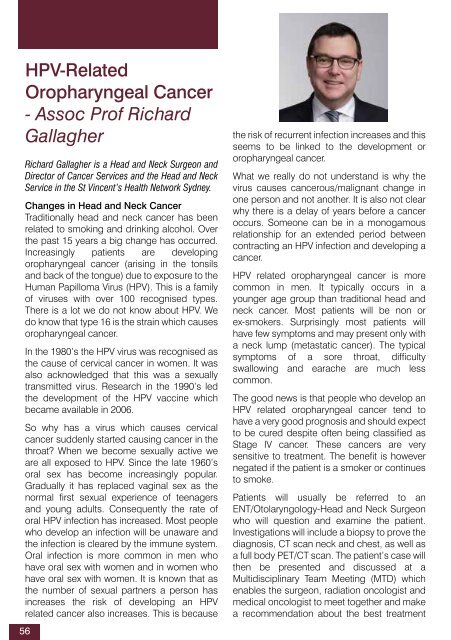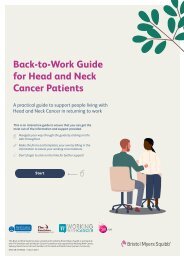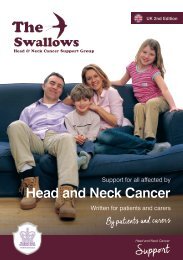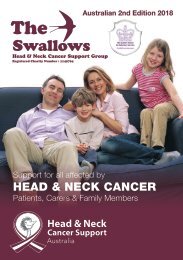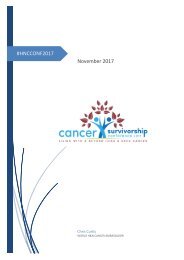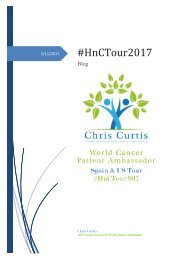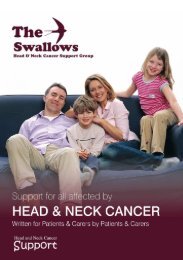The Swallows Australian Edition Magazine
Create successful ePaper yourself
Turn your PDF publications into a flip-book with our unique Google optimized e-Paper software.
HPV-Related<br />
Oropharyngeal Cancer<br />
- Assoc Prof Richard<br />
Gallagher<br />
Richard Gallagher is a Head and Neck Surgeon and<br />
Director of Cancer Services and the Head and Neck<br />
Service in the St Vincent’s Health Network Sydney.<br />
Changes in Head and Neck Cancer<br />
Traditionally head and neck cancer has been<br />
related to smoking and drinking alcohol. Over<br />
the past 15 years a big change has occurred.<br />
Increasingly patients are developing<br />
oropharyngeal cancer (arising in the tonsils<br />
and back of the tongue) due to exposure to the<br />
Human Papilloma Virus (HPV). This is a family<br />
of viruses with over 100 recognised types.<br />
<strong>The</strong>re is a lot we do not know about HPV. We<br />
do know that type 16 is the strain which causes<br />
oropharyngeal cancer.<br />
In the 1980’s the HPV virus was recognised as<br />
the cause of cervical cancer in women. It was<br />
also acknowledged that this was a sexually<br />
transmitted virus. Research in the 1990’s led<br />
the development of the HPV vaccine which<br />
became available in 2006.<br />
So why has a virus which causes cervical<br />
cancer suddenly started causing cancer in the<br />
throat? When we become sexually active we<br />
are all exposed to HPV. Since the late 1960’s<br />
oral sex has become increasingly popular.<br />
Gradually it has replaced vaginal sex as the<br />
normal first sexual experience of teenagers<br />
and young adults. Consequently the rate of<br />
oral HPV infection has increased. Most people<br />
who develop an infection will be unaware and<br />
the infection is cleared by the immune system.<br />
Oral infection is more common in men who<br />
have oral sex with women and in women who<br />
have oral sex with women. It is known that as<br />
the number of sexual partners a person has<br />
increases the risk of developing an HPV<br />
related cancer also increases. This is because<br />
56<br />
the risk of recurrent infection increases and this<br />
seems to be linked to the development or<br />
oropharyngeal cancer.<br />
What we really do not understand is why the<br />
virus causes cancerous/malignant change in<br />
one person and not another. It is also not clear<br />
why there is a delay of years before a cancer<br />
occurs. Someone can be in a monogamous<br />
relationship for an extended period between<br />
contracting an HPV infection and developing a<br />
cancer.<br />
HPV related oropharyngeal cancer is more<br />
common in men. It typically occurs in a<br />
younger age group than traditional head and<br />
neck cancer. Most patients will be non or<br />
ex-smokers. Surprisingly most patients will<br />
have few symptoms and may present only with<br />
a neck lump (metastatic cancer). <strong>The</strong> typical<br />
symptoms of a sore throat, difficulty<br />
swallowing and earache are much less<br />
common.<br />
<strong>The</strong> good news is that people who develop an<br />
HPV related oropharyngeal cancer tend to<br />
have a very good prognosis and should expect<br />
to be cured despite often being classified as<br />
Stage IV cancer. <strong>The</strong>se cancers are very<br />
sensitive to treatment. <strong>The</strong> benefit is however<br />
negated if the patient is a smoker or continues<br />
to smoke.<br />
Patients will usually be referred to an<br />
ENT/Otolaryngology-Head and Neck Surgeon<br />
who will question and examine the patient.<br />
Investigations will include a biopsy to prove the<br />
diagnosis, CT scan neck and chest, as well as<br />
a full body PET/CT scan. <strong>The</strong> patient’s case will<br />
then be presented and discussed at a<br />
Multidisciplinary Team Meeting (MTD) which<br />
enables the surgeon, radiation oncologist and<br />
medical oncologist to meet together and make<br />
a recommendation about the best treatment


